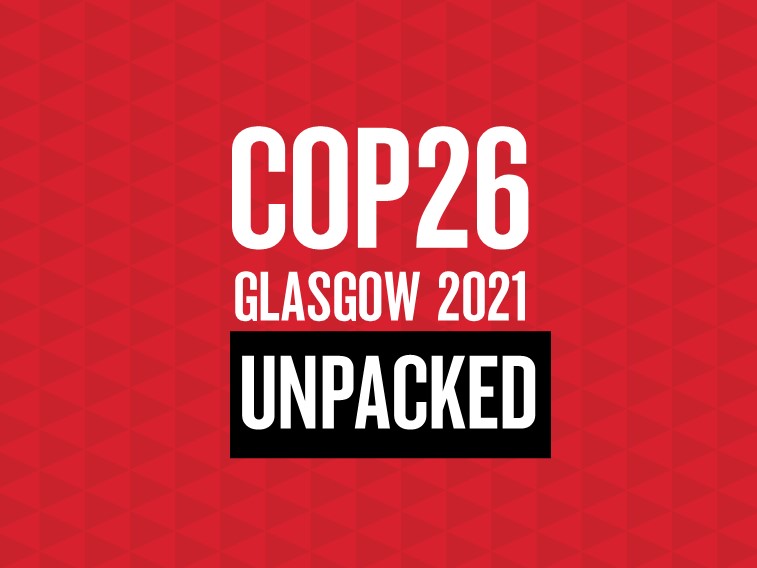On a seasonally adjusted basis, the NAB Online Retail Sales Index recorded a drop in growth in July


Insight
Global experts give their insights into the recent Glasgow summit in a special roundtable discussion presented by NAB Corporate & Institutional Banking.

As delegates returned from this year’s much-anticipated COP26 climate summit, questions remain on how countries will follow through on the promises made, and whether the final results are a “breakthrough or breakdown” at this crucial time for global action.
To help navigate the impacts, NAB Corporate & Institutional Banking recently brought together a panel of climate finance experts for some provocative analysis and discussion on what COP26 means as the world progresses to net zero.
While agreeing on the difficulties of reaching consensus among the 197 countries to sign the Glasgow Climate Pact, panellists saw the rise of climate finance at the talks as a strong positive step in accelerating action to deliver on the ambitions of Paris 2015.

Attending this year, she said the sector – and in particular banking – was “very much front and centre in the main room with the world leaders”.
“I think there’s finally an understanding that without public and private financing we aren’t going to be able to accelerate climate change at the pace that we need,” Reynolds said.
“I feel that the private sector is now in many ways actually ahead of many governments of the world and that we are pushing governments to make change and that is a big difference.”
Sarah Kemmitt, the UN Environment Programme Finance Initiative (UNEP FI) Lead for the Collective Commitment to Climate Action (CCCA), said she was optimistic on what the summit had been able to deliver – citing announcements like the US-China agreement as truly significant progress.
“Given the geopolitical situation at the moment that really can’t be underestimated,” Kemmitt said. “Given the pace of change that we’ve seen over the last year in terms of attitudes and buy-in and the ability to really roll up sleeves, I’m hoping that these foundations pave a really good way for the next 12 months.”
Kemmitt previously worked with the Bank of England and was involved in putting in place the mandatory Task Force on Climate-related Financial Disclosures (TCFD) reporting in the UK.
She was among those who had expressed early support for the formation of the International Sustainability Standards Board (ISSB) announced at Glasgow which promises to elevate sustainability to the same status as financial reporting, sitting alongside the International Accounting Standards Board (IASB).
“It’s just so vital because everybody knows that the current landscape is far too fragmented,” Kemmitt said. “In terms of the digital reporting, this can just be such a gamechanger in the information that people are able to get throughout the investment chain, and throughout the real economy value chains. We need this all to be interoperable, and aggregable and pluggable.”
To avoid any bottlenecks in the ambitious timeframe for implementation, she urged immediate movement on which bodies would be ratifying, implementing and adopting those standards as well as how they flow through into audit standards.
Kemmitt said she was encouraged by the Glasgow Financial Alliance for Net Zero (GFANZ) bringing together the whole financial system to the task.
“Nobody’s role is unaffected by climate and we all need to think about our role and our leadership,” she said.
Climate Bonds Initiative CEO Sean Kidney agreed one of the most exciting things was “the extraordinary visibility of the finance sector”, including GFANZ and its $US130 trillion in investment, along with government representatives brokering agreements between major global economies.
“The number of ministries of finance I saw there for the first time at any kind of scale was there because they’ve suddenly realised this is becoming material,” Kidney said. “This is a material risk, both positive and negative.”
He said a taste of that risk was evident in the Australian government’s modelling for net zero which noted the financial penalties for inaction as the cost of capital rises. He urged the nation to take advantage of the waves sweeping the global economy for a more rapid transition.
Terence Jeyaretnam, Climate Change and Sustainability Services Partner, EY Oceania, also pointed to the need for a “consistent signal” for industry to be able to capitalise on the opportunities presented amid an environment of heightened disclosure.
“If I was an Australian company, I would be moving very quickly to start to have a look at climate impacts, carbon inventory, climate risk. There’s a mass of companies that need to start to look at climate change and carbon risk and carbon reporting.”
For those higher emitters who were more progressed in their reporting programs, there was also still much work to do. Whether this was something material for auditors would “depend on the corporate trajectory much more than a regulated market” in the immediate post-COP environment, he said.
“If you’re in the top 150 you’d have to look at strengthening the governance around this disclosure to account for things like documentation, things like quality systems, controls, assurance that come with the weight of accounting standards,” Jeyaretnam said.
From her work with investors, PRI’s Reynolds stressed companies needed to focus on shorter term transition targets, as increasingly funds were benchmarking to 2025 and 2030 rather than 2050.
“The only way for those investors to actually be able to reduce those emissions in time is to change the way they invest,” she said. “So that is going to have an impact on the market.
“Engagement with companies, voting, using your shareholder rights are some of the key things you can do and we see that happening through investor initiatives that we’re involved in.”
While factors like the agreement on Article 6 provides a pathway for the global carbon market and important opportunities going ahead, Climate Bonds’ Kidney said from an investor perspective now, it was the more ambitious commitments by major economies, like the US-China pact, that were driving global change and capital flows. For fossil fuels this means quicker exit strategies, while other investors are looking to green hydrogen and clean tech as the way of the future.
“It’s the opportunities that count and that’s where Australia needs to be looking at,” he said.
EY’s Jeyaretnam said Australia has already shown some great innovation for future clean energy exports through work on hydrogen and projects like Sun Cable, with the nation now needing to take a lead in the region.
“I think the opportunity for us is to export innovation to APAC,” he said.
UNEP FI’s Kemmitt said it was important for corporates and financial institutions to be really clear about how they were accounting for net zero to “prioritise really deep decarbonisation” so they don’t just “shift the problem”.
“Markets need to differentiate between what’s a carbon removal and what’s an avoided emission,” she said.
Kemmitt added it was important to ensure those real, nature-based solutions behind the instruments to protect and restore carbon sinks. This needs to done with both ecological sensitivity and respect to the rights of Indigenous peoples around the world, she said.
Taking audience questions, Reynolds said Australian industry should expect added pressure from international investors on the speed of transition plans for every stakeholder, given the COP26 ambition.
“I think that’s really going to step up,” she said.
To close out the session, Kemmitt added: “If corporates are not engaging and producing really robust transition plans they will be left behind – that will be seen as too big a risk.”
Kemmitt concluded by saying the solution means examining activity through a 1.5C perspective, industry by industry, asset by asset, as we rapidly move to close the gaps and ensure a smooth path to transition and the opportunities this will bring for all.
The COP26 Unpacked event was hosted by NAB Executive, Corporate Finance, Connie Sokaris with discussion moderated by NAB Head of Sustainable Finance David Jenkins.
Read more on COP26 week one takeaways and the week two Glasgow conclusion.
Speak to a specialist
© National Australia Bank Limited. ABN 12 004 044 937 AFSL and Australian Credit Licence 230686.